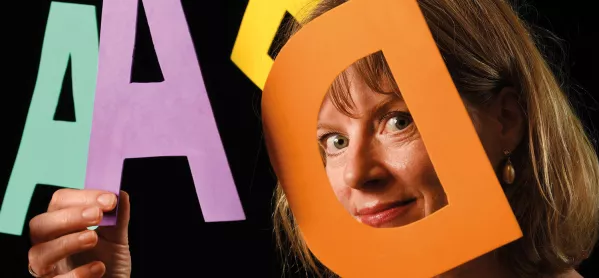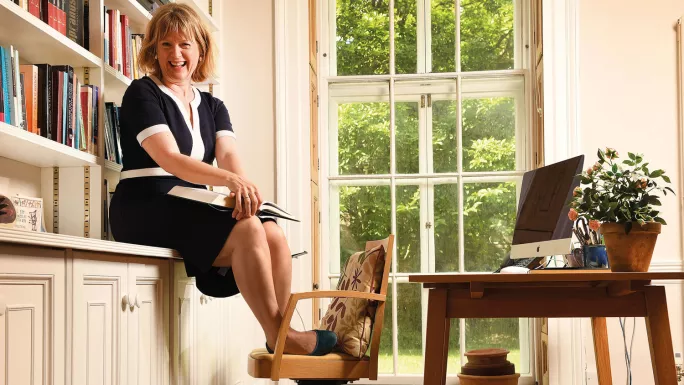- Home
- Balance phonics and comprehension to boost reading
Balance phonics and comprehension to boost reading

“The idea that phonics is kids just barking at print is such a limited way of looking at things - good phonic knowledge opens the world,” proclaims Kate Nation, professor of experimental psychology at St John’s College, Oxford.
And with that sentence, a thousand arguments begin. For nothing in education is likely to stir up spirited debate as much as someone taking a view on phonics.
But Nation’s view does come from a place of deep knowledge about how we learn to read. Tucked away in a quiet corner at the bottom of a spiral staircase, her office exposes her area of special interest instantly: the walls are covered with artwork celebrating the joys of a good book.
Nation is director of ReadOxford, a research group with a wide-ranging remit to investigate key questions about reading. Nation’s own studies are focused towards the way children learn to decode and understand words, moving from novice readers to experts. That journey is, of course, predominantly guided by teachers, so Nation’s research could have wide-ranging implications in schools. So what has she discovered?
Firstly, she is keen to point out that she believes many early years classrooms are mostly getting it right already when it comes to reading: as long as they are getting the right balance between the two core tasks when it comes to teaching children to read.
“Two sets of things are critical for early readers,” she argues. “You have to understand how the writing system works - the idea that letters represent sounds. It can be a penny dropping moment for some kids, the understanding that this letter S is changing the word because it changes the sound.
“And then the other side of the coin is that we read to comprehend, too. We need that alphabetic principle, but we also need a broader understanding of language.”
Critical knowledge
The first part, of course, brings us to phonics. Nation is dismissive of myths belittling the value of good phonics teaching and hopeful that such myths are given short shrift in most primary schools these days.
“If we can’t read words we can’t access so much other information,” she states.
She is also keen to dispel the idea that phonics is somehow a dull necessity.

“Phonic knowledge is critical, but not boring and low-level,” she explains. “It allows children to access all sorts of exciting elements of wordplay - even to make up new words. One older child came up with the word ‘manfragette’ as a ‘male rights’ version of suffragette.
“The ability to do this comes from those very early phonic tools, even though changing a word and giving it a meaning in a way the reader appreciates is a complex skill.”
She is clear that phonics is not the whole story when it comes to early reading, though. “It’s necessary, but not sufficient!” as Nation puts it. She sees comprehension as equally important but wonders if it is as deeply and formally embedded, especially early on.
She reiterates what is now well known among teachers: that comprehension starts with language.
“Broadly, the better language skills a child has, the easier they will find reading,” she explains. “There are huge variations when it comes to the skill levels children arrive at school with, but longitudinal studies show that how good language skills are on starting school is a very good predictor of academic success and emotional wellbeing later on.”
Identifying problems
However, while phonics teaching has been systemised and formalised, Nation questions whether other important language skills have been systemised in the same way. Her fear is that teachers are largely left to rely on their skill and experience in order to identify and understand the language problems with which some children enter education. She also questions whether we always recognise how much comprehension practice is happening before children even arrive at school. That practice is important, she says.
“You can never [start] too early with comprehension,” she explains. “And hopefully, spoken comprehension practice is happening before kids even get to education.”
She argues that this has to run parallel to phonic knowledge.
“Pre-schoolers sharing books with an adult are developing their comprehension skills even if they’re not ‘reading’ the words themselves,” she states. “If you look at language in pre-reading books it is different to spoken language, so you’re still getting things from reading you wouldn’t get from speech. We need to think more about how to capitalise on the vocabulary and the written language that this exposes children to.”
Indeed, she believes a key component of the difficulty some children have with reading is not down to a poor grasp of phonics but a simple lack of exposure to language.
“This exposure to language might explain the gap that can exist because of social advantage,” she argues. “Children with lots of language comprehension and practice can have a massive vocabulary and advanced skills before they even get to school and then be taught phonic skills and apply them. Those without can be left playing catch-up no matter how quickly they grasp the phonic system.
“You need both strands. Beautiful phonic knowledge is limited if you can’t construct meaning and vice versa. No matter how good your comprehension is, you need to be able to read the individual words.”
But while she is certain on these points, there are plenty of elements of learning to read that, she says, remain rather less clear.
“We know practice matters and it might just be honing those basic skills - like going to the gym and flexing your biceps - but reading is also about connected language and variety,” she explains.
“If you compare how well children learn a word if they see it five times, is it OK if they see it five times in the same book, or are five different books better? We know that this can be how learning works in other contexts - that these principles of variation, spacing things out over time do seem to improve learning - so there are lots of reasons to predict that it might make a difference for reading, too.”
And if this does turn out to be the case there are further implications.
“It might even be that we change reading books on the basis of this knowledge, thinking about how we structure them to optimise learning experience. This idea of variety might also explain why wider reading experience correlates with outcome,” she says.
Linked to this idea of variety, there are also questions around the technology that is now an integral part of many children’s reading experiences, says Nation.
“The impact of technology is an active research area and technology can certainly support good teaching of reading, but it’s worth noting that a few hundred years ago books themselves were the new technology because most people didn’t have access to them,” she says. “Again, one thing to look at might be word learning across different contexts: does looking at a word once on a screen and once in a book improve learning? Technology can also help to make language learning fun and to make it less dependent on having an adult always there, but we mustn’t lose sight of the fact that the bells and whistles technology can provide only work if children can read in the first place.”
Love for language
While research into these areas continues, Nation reiterates that the main focus for schools - or at least those schools that have phonics teaching sorted - should be language.
“If I could emphasise one thing in modern education, I’d really want to put this idea of language back at the heart of the curriculum. Language is important for reading but also for emotional regulation and self-expression. I don’t think the impact of rich communication can be over-estimated.”
Because reading touches almost every other subject in one way or another, Nation also believes that it can make a holistic difference, too: “Ultimately, lots of strategies for teaching good reading also make for mentally well children. It’s not just about knowledge and vocabulary.
“Actually, reading skills can be life skills.”
Kate Townshend is a teacher in Gloucestershire. She tweets @_KateTownshend
Keep reading for just £1 per month
You've reached your limit of free articles this month. Subscribe for £1 per month for three months and get:
- Unlimited access to all Tes magazine content
- Exclusive subscriber-only stories
- Award-winning email newsletters



